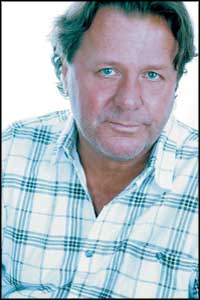By Shawn Perry
When Asia reunited for their 25th Anniversary, no one quite knew what to make of it. Here was a band of high caliber, seasoned musicians who decided to fall in with the mainstream to create a leaner grade of progressive rock in the early 80s. It was a radio-friendly, visually enhanced approach, but not without its shortcomings. Guitarist Steve Howe and drummer Carl Palmer eventually returned to the comfortable confines of Yes and ELP. Through it all, keyboardist Geoff Downes has remained the sole survivor of Asia, while John Wetton, the band’s vocalist and bassist, came and left twice without much fuss or fanfare. Of all the members of Asia, he was the one who seemed destined for bigger and better things.
Wetton more than paid his dues as a member of several prominent British bands of the 70s. He made two albums with Family before accepting an invitation from old friend Robert Fripp to join King Crimson. From 1972’s Larks’ Tongues In Aspic through 1974’s Red, Wetton sang, played bass, and wrote much of the material for Crimson during an extremely fertile period in their lumpy history. When Fripp announced that he was disbanding the group for good in the mid 70s, Wetton quickly found work as a bassist with Roxy Music and Uriah Heep. It wasn’t long until he felt compelled to step out from the shadows and lead a group of his own. With former Crimson band mate and drummer Bill Bruford, He co-founded UK, a sleek progressive unit of the late 70s that also featured guitarist Allan Holdsworth and keyboardist/violinist Eddie Jobson. As luck would have it, the timing was ill-conceived as new wave, disco, and punk moved in, and the whole shooting match was swallowed up by MTV and behemoth record companies.
Wetton, who’d always favored short and simple melodies over the esoteric, lengthy strains of progressive rock, reinvented himself for the role of lead singer of Asia. In 1982, they would become first “supergroup” of the decade to enjoy the best of both worlds — the love of the record-buying public and the respect of their peers. As often is the case, Asia collapsed under its own weight and never quite regained its composure. Wetton remained prolific with several solo and collaborative efforts over the years, but he began to feel the tug of past glories when he reunited with Downes for two albums. It worked out so well between the two that they called Howe and Palmer, proffering the notion of mounting the mighty Asia ship for another round. Once everyone’s prior commitments were honored, the original Asia regrouped for a late summer, month-long tour of America. The venues were smaller and the crowd was older and grayer, but the response was overwhelming. Presently on a short break, Asia is scheduled to play more shows in England and Scotland in late November and early December, with plans in place for a DVD and subsequent tours in 2007.
In addition to regaining his artistry with Asia, Wetton recently overcame a long battle with the bottle. At 57, he is sober, happy and extremely optimistic. This was all apparent when I saw him fronting Asia for a breath-taking set the night before the following interview. When we spoke the next morning, Wetton was a bit hoarse, but openly and honestly upbeat about his colorful history, as well as his present dalliance with Asia. While it’s hard to say what lies over the horizon, one can’t help but think of the group’s song that breezily proclaims, “Only time will tell…”
To read the rest of this interview, order your copy of
Conversations with the Masters:
The VintageRock.com Interviews




















